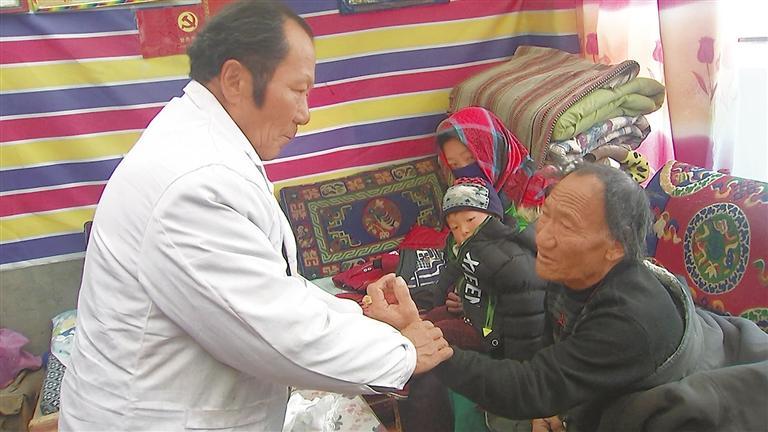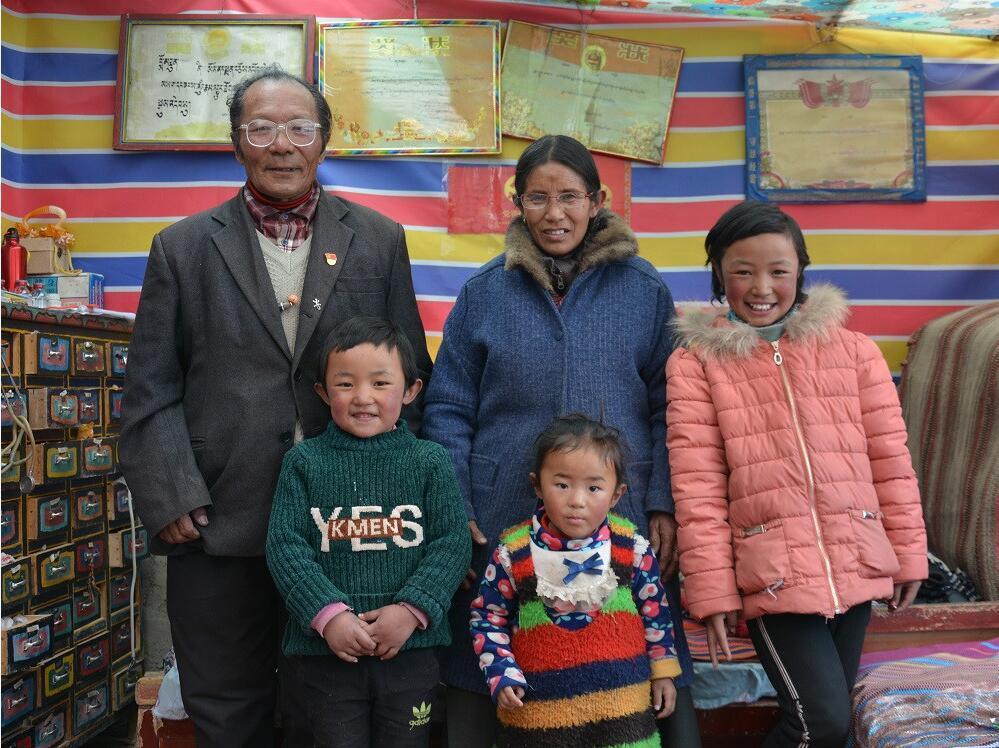By Liu Fang, Zhi Xinghua Source:China Tibet News 2019年04月24日 10:14

Photo shows rural doctor Sangpa (L) diagnosing a patient at his home. [China Tibet News/Wang Chun]

Photo shows the photo of Sangpa, his wife and their grandchildren. [China Tibet News/Wang Chun]
Background:
Sangpa, male, born in May 1946, is 73 years old. He is a rural doctor of Qianggu Village of Oma Town in Gerze County of Tibet's Ngari Prefecture. Before the democratic reform of Tibet in 1959, with heavy taxes and under the exploitation of usury, Sangpa and his family have undergone a hellish life of serfs.
After the democratic reform, Sangpa has been trained to be a rural doctor and became famous for his medical skills. At present, children and grandchildren of Sangpa all live in Qianggu Village, enjoying a stable and prosperous life. Sangpa's second son Pug Tsering is elected by the villagers as the director of the village committee. In recent years, Qianggu village vigorously carries out the reform of pastoral areas, achieving remarkable results. In 2018, the per capita net income of the village has reached 15,547 yuan RMB.
Being engaged in the medical profession for 56 years, Sangpa has mastered Tibetan and Western diagnosis and treatment methods. He can diagnose patients in an orderly way, and it is hard to see that he is already 73 years old.
On the living room cabinet of Sangpa's home, there are more than 20 honorary certificates. From 1967 winning his first honorary certificate to now, Sangpa has gained many certificates including "advanced individual of Oma Town" and "national excellent rural doctor".
Before the democratic reform, all of Sangpa's family members were herders of a local tribe. Shouldering heavy taxes and duty, he was sent to herd when he was only 7 years old. In old Tibet, they didn't have warm clothes and could not sleep at night.
"At that time, the tribes used stones to grind highland barley, the most delicate Zanba flour was for the tribal leaders and officials to eat, the rest for yaks, we only got to eat what yaks didn't eat,” Sangpa said.
One day, Sangpa was so tired that he overslept. Tribal officials threw burning straw ropes around his neck, he felt burned in his sleep and rolled around in pain while the officials roared with laughter.
"I clearly remembered that in 1959, the PLA came to rescue us with 'iron yaks'!" Sangpa said. At that time, he was sitting on the hill and suddenly saw military vehicles shaped like "iron yaks" galloping across the grassland.
Before the winter of 1960, Sangpa was given butter, tea bricks, highland barley, and four sets of brand-new military coats, boots, hats and gloves. Holding never-seen gloves, Sangpa tampered for a long time, surprised that the fingers also need to wear "clothes".
"The party gave me a new life, from then on, I wanted to repay the party's kindness.” In 1963, 17-year-old Sangpa signed up for medical training class. In 1995, he joined the Chinese Communist Party.
"Under the wise leadership of the communist party, we are getting better day by day," Sangpa said steadfastly. As a communist party member and a doctor, he will continue to do his best to treat patients and serve the masses.